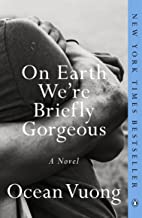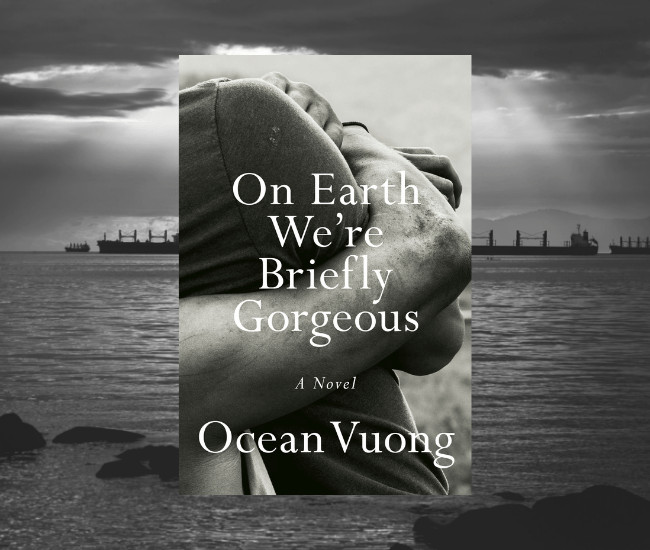On Earth, We’re Briefly Gorgeous by Ocean Vuong
On Earth, We’re Briefly Gorgeous (Penguin Press) is a hallucinogenic and free-wheeling meditation on addiction, violence and love, composed as a series of letters to an illiterate immigrant mother. Written by award-winning poet Ocean Vuong, this is ultimately a book about language and memory, the challenge of channeling and crystalizing an experience with words.
Puns and wordplay abound. The narrator asks at the beginning, “What is a country by a life, a borderless sentence?” The theme of language as power comes up repeatedly and naturally enough. An opening scene describes the narrator squaring off against a classmate who disdains his faltering language skills: “He was only nine, but he’d already mastered the dialect of damaged American fathers.”
Although flawed, the narrator’s English skills surpass his mother’s, and he soon becomes her translator. Ma, whose experiences as a child have led her to speak “partially in Vietnamese, but entirely in war,” works in a nail salon, “a place where dreams become the calcified knowledge of what it means to be awake in American bone… aching, toxic and underpaid.” She must subsume herself linguistically to her clients. In seeking their tips, she apologizes “dozens of times throughout a forty-five minute manicure… sorry is a tool one uses to pander until the word itself becomes currency.”
Complicating the mother-son relationship, the narrator explores the abuse he suffers at Ma’s hands. Again, he transmutes language, describing her actions with a harrowing abstraction that suggests the distancing techniques he’s developed for enduring this violence. He writes, ”The first time you hit me, I must have been four. A hand, a flash, a reckoning. My mouth a blaze of touch.” In another section, he says, “The first time you threw a box of Legos at my head. The hardwood dotted with blood.”
Throughout, these letters speak of the limitations and challenges of memory and storytelling, searching for meaning. As the narrator says, “Days I feel like a human being, and days I feel more like a sound. I touch the world not as myself but as an echo of who I was.” Indeed, echoes are a constant motif, as is the idea that “Whether we want to or not, we are traveling in a constant spiral, we are creating something new from what is gone.” Other letters explore his mother and grandmothers’ mental health lapses as they experience flashbacks again linked to noise. Mistaking fireworks for bombs, his grandmother says, “‘If you scream… the mortars will know where we are.’”
Scattered moments of communication-based joy jut through the more sobering scenes. Describing his first pair of light-up sneakers, the narrator recalls how they “erupted with silent flares. The world’s smallest ambulances, going nowhere.” The narrator also reveals the positive side to abstract thinking, such as when his mother reassures him that clouds outside of an airplane are merely boulders. His terror at flying turns to glee: “The plane should rattle, it should nearly shatter… I sat back and watched as we broke through one mountain after another.”
The book’s second part reckons with the narrator’s homosexuality, recalling his doomed teenage affair with a boy named Trevor. The thematic content of earlier letters is reinforced and expanded here. As the narrator says of their first meeting, “I studied him like a new word.” In this relationship, the narrator comes to learn a hankering for the unknown and inexpressible that soon manifests itself in drug addiction.
He calls Trevor “a boy breaking out and into himself at once. That’s what I wanted–not merely the body, desirable as it was, but its will to grow into the very world that rejects its hunger.” The narrator once more invokes a sense of circularity and echoes, saying, “And what do you do to a boy like that but turn yourself into a doorway, a place he can go through again and again, each time entering the same room?” Language once more becomes noise, such as when the lovers re-sing their favorite song to each other “…until the blood on our faces grabbed around our lips and stiffened us quiet.” We soon understand addiction as the endless repetition leading nowhere.
Readers will come away impressed by Vuong’s arresting prose, which leads us to question whether experience can ever bend to language, and whether our attempts can possibly outlast us. As he writes, “Can you hear me yet? Can you read me?”
On Earth, We’re Briefly Gorgeous is available for purchase.
RELATED READS
Find out what Jennifer Blankfein thought of this book on her blog, Book Nation By Jen
Buy this Book!
Amazon



